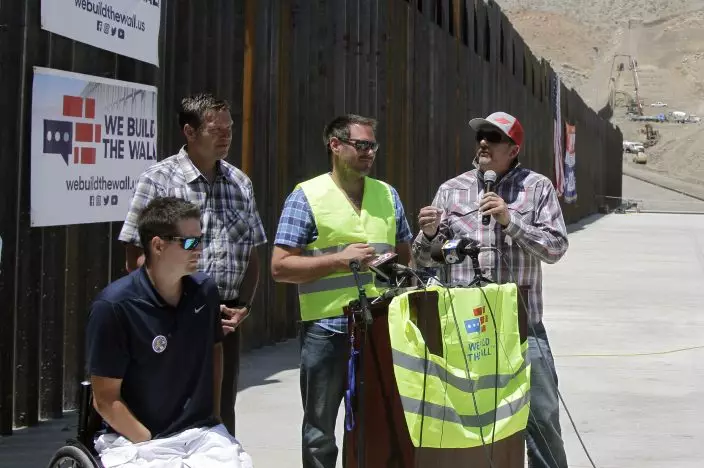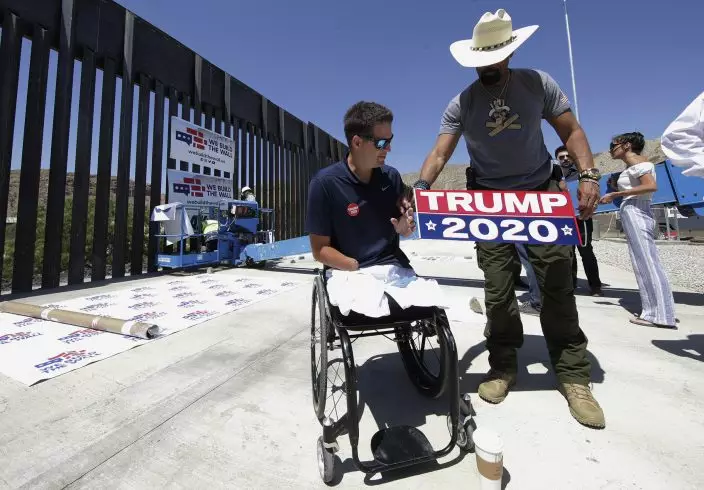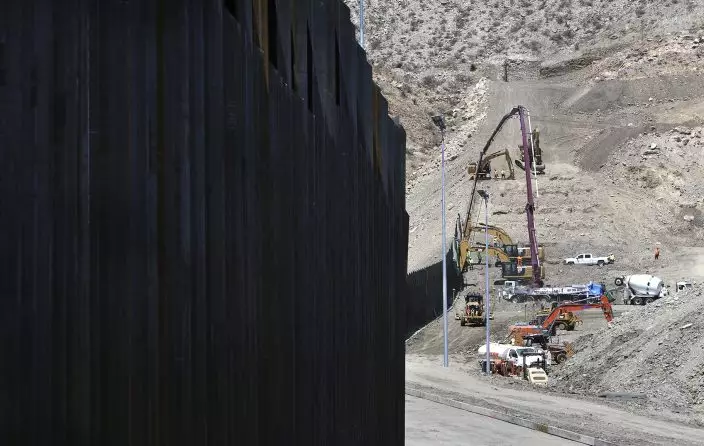Organizers behind an online fundraising campaign to build privately funded barrier along the U.S.-Mexico border said Thursday that they cleared a construction hurdle with a city in southern New Mexico and that they have plans for 10 more projects.
Workers poured concrete and a Trump 2020 banner hung on a section of bollard-style barriers at the site in Sunland Park. The work resumed after We Build the Wall Inc. obtained a pair of permits from local officials, who had temporarily halted construction.
The section is a symbolic victory for supporters of President Donald Trump's efforts to build barriers along the border as Congress and the courts have blocked some of his efforts to curb illegal immigration.

Leaders of We Build the Wall Inc. discuss plans for future barrier construction along the U.S.-Mexico border, Thursday, May 30, 2019, in Sunland Park, N.M. The group expects to finish a segment of 2,300 feet of bollard-style fencing on private land, after raising around $23 million through a crowd-funding website. Organizers say it will have money left over for future projects. (AP PhotoCedar Attanasio)
Once completed, the section in New Mexico will be just under a half-mile long, a tiny portion of the 1,954-mile (3,145-kilometer) southern border. The group estimates the price tag will range from $6 million to $8 million.
Brian Kolfage, an Air Force veteran who created We Build the Wall Inc., visited the site Thursday. He declined to provide more details about plans for future projects and would not reveal where they would be.
"Nothing is off the table," Kolfage said when asked if his supporters would flood local authorities with phone calls if they resist future projects, which Sunland Park faced.

We Build the Wall Founder Brian Kolfage, left, and David Clarke Jr., a board member of the group, prepare for a news conference in Sunland Park, N.M., Thursday, May 30, 2019. The New Mexico city is allowing construction to resume of the privately funded barrier along the U.S.-Mexico border following questions about its permit. (Mark LambieThe El Paso Times via AP)
The group had erected around 1,500 feet (457 meters) of fencing along private property over the weekend without going through Sunland Park's review process.
Building inspectors determined that an application for a construction permit was incomplete and the city sent a cease-and-desist order. That prompted thousands of phone calls from the group's supporters.
Once the city completed its review, it issued permits for the structure itself and related pedestals for lighting.

Workers build a privately-funded barrier on private land in Sunland Park, N.M., Thursday, May 30, 2019. The New Mexico city is allowing construction to resume of the privately funded barrier along the U.S.-Mexico border following questions about its permit. (Mark LambieThe El Paso Times via AP)
"Neither phone calls, emails, nor visits to City Hall played a role in our decision to issue permits," City Manager Julia Brown told The Associated Press in an email Thursday. "The requirement to file an application for a permit, the review of applications and inspection of construction projects is a purely regulatory process and function."
The group plans to sign an agreement that will allow U.S. border authorities to patrol the private property without having to hand over ownership to federal officials, said Kris Kobach, the group's legal counsel and a former Kansas secretary of state.
Kolfage said he chose the site in southern New Mexico because of a willing landowner and its proximity to what he described as a busy smuggling corridor. He also credited the attention drawn by a militia group that posted videos of large groups of migrants crossing the border.
U.S. authorities confirmed Thursday that a single group of more than 1,000 migrants crossed in neighboring El Paso, Texas, early Wednesday, marking the largest group ever encountered by Border Patrol agents.
U.S. Customs and Border Protection Deputy Commissioner Robert E. Perez said in a statement that the latest group "demonstrates the severity of the border security and humanitarian crisis at our Southwest border."
"I rolled across New Mexico and rolled back, in my wheelchair," said Kolfage, a triple amputee. "I knew this was a bad area."
UNITED NATIONS (AP) — Russia on Wednesday vetoed a U.N. resolution sponsored by the United States and Japan calling on all nations to prevent a dangerous nuclear arms race in outer space.
The vote in the 15-member Security Council was 13 in favor, Russia opposed and China abstaining.
The resolution calls on all countries not to develop or deploy nuclear arms or other weapons of mass destruction in space, as banned under a 1967 international treaty that included the U.S. and Russia, and to agree to the need to verify compliance.
U.S. Ambassador Linda Thomas-Greenfield said after the vote that Russian President Vladimir Putin has said Moscow has no intention of deploying nuclear weapons in space, but that the country's veto raises the question of what the government may be hiding.
THIS IS A BREAKING NEWS UPDATE. AP’s earlier story follows below.
UNITED NATIONS (AP) — The U.N. Security Council is set to vote Wednesday on a resolution sponsored by the United States and Japan calling on all nations to prevent a dangerous nuclear arms race in outer space. It is likely to be vetoed by Russia.
The resolution calls on all countries not to develop or deploy weapons of mass destruction, like nuclear arms, in space.
U.S. Ambassador Linda Thomas-Greenfield told a council meeting on March 18 where she announced the resolution that “any placement of nuclear weapons into orbit around the Earth would be unprecedented, dangerous and unacceptable.”
Russia’s deputy U.N. ambassador, Dmitry Polyansky, retorted that Moscow’s initial impression was that the resolution is “yet another propaganda stunt by Washington” and is “very politicized” and “divorced from reality.”
The announcement of the resolution followed White House confirmation in February that Russia has obtained a “troubling” anti-satellite weapon capability, although such a weapon is not operational yet.
Russian President Vladimir Putin declared later that Moscow has no intention of deploying nuclear weapons in space, claiming that the country has only developed space capabilities similar to those of the United States.
The draft resolution says “the prevention of an arms race in outer space would avert a grave danger for international peace and security.”
It urges all countries carrying out activities in exploring and using outer space to comply with international law and the U.N. Charter.
The draft “affirms” that countries that ratified the 1967 Outer Space Treaty must comply with their obligations not to put in orbit around the Earth “any objects” with weapons of mass destruction, or install them “on celestial bodies, or station such weapons in outer space.”
The treaty, ratified by some 114 countries including the United States and Russia, prohibits the deployment of “nuclear weapons or any other kinds of weapons of mass destruction” in orbit or the stationing of “weapons in outer space in any other manner.”
The draft resolution emphasizes “the necessity of further measures, including political commitments and legally binding instruments, with appropriate and effective provisions for verification, to prevent an arms race in outer space in all its aspects.”
It reiterates that the U.N. Conference on Disarmament, based in Geneva, has the primary responsibility to negotiate agreements on preventing an arms race in outer space.
The 65-nation body has achieved few results and has largely devolved into a venue for countries to voice criticism of others’ weapons programs or defend their own. The draft resolution urges the conference “to adopt and implement a balanced and comprehensive program of work.”
At the March council meeting where the U.S.-Japan initiative was launched, U.N. Secretary-General António Guterres warned that “geopolitical tensions and mistrust have escalated the risk of nuclear warfare to its highest point in decades.”
He said the movie “Oppenheimer” about Robert Oppenheimer, who directed the U.S. project during World War II that developed the atomic bomb, “brought the harsh reality of nuclear doomsday to vivid life for millions around the world.”
“Humanity cannot survive a sequel to Oppenheimer,” the U.N. chief said.

FILE - U.S. Ambassador to United Nations Linda Thomas-Greenfield speaks on Thursday, April 18, 2024, in Tokyo. The U.N. Security Council is set to vote Wednesday, April 24, 2024, on a resolution announced by Thomas-Greenfield, calling on all nations to prevent a dangerous nuclear arms race in outer space. It is likely to be vetoed by Russia. (AP Photo/Eugene Hoshiko, Pool, File)













